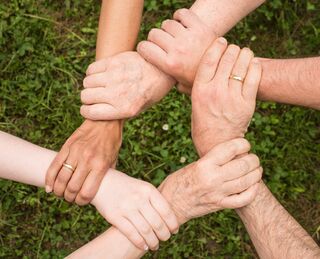Adolescence
Positive Relationships in Adolescence Lead to Stronger Adult Mental Health
The protective effects of strong family bonds.
Posted March 10, 2021 Reviewed by Chloe Williams
- Adolescents with high levels of family cohesion and low levels of family conflict are less likely to report symptoms of depression from 12 to 42 years of age, according to research.
- The findings add to a body of research that suggests that having positive relationships during adolescence bolsters mental health in adulthood.
- Making time to check in with teenagers and build family cohesion could have long-term benefits for families.
In my pediatric practice, a father recently mentioned that he was cutting back from working full-time in order to be more involved in his sons’ lives as they entered puberty. “My wife was home when the boys were younger,” he told me. “Now it’s my turn.” Although this decision may have simply reflected this particular family’s efforts to equalize child care responsibilities, a recent study out of the University of North Carolina at Chapel Hill suggests their decision may also have long-term positive benefits for the whole family.
The study, published in 2019 by the Journal of the American Medical Association Pediatrics, looked at the impact of positive family relationships in adolescence on the development of depression into early mid-life. It analyzed data from the National Longitudinal Study of Adolescent to Adult Health, a nation-wide representative group of over 18,000 individuals, followed for over 20 years, starting in grades 7 through 12 and ending when the group was in their 40s.
Two aspects of family relationships were studied: family cohesion and parent-child conflict. Cohesion was measured by asking adolescents how much their family members paid attention to them, understood them, and whether or not they and their family had fun together. Responses were graded from not at all to very much. Similarly, parent-child conflict was assessed by asking adolescents whether or not they had had a serious argument about their behavior with one or both of their parents in the past month.
In general, levels of depressive symptoms were lower among those adolescents with higher levels of family cohesion. Both males and females reporting high levels of family cohesion and low levels of parent-child conflict reported fewer depressive symptoms overall from age 12 to 42. Females experienced higher levels of depression during early adolescence. These declined until their 30s, then rose again, whereas males experienced a shorter period of adolescent depression, and then were stable into their 30s and 40s when symptoms increased.
Many studies have looked at the effects of adverse childhood experiences and toxic stress on mental and physical health in adults as well as the protective effects positive relationships can have in this time period. (I have reported on some in my past blog posts right here.)

What is so heartening to me about this new study is that these protective experiences like family cohesion can have their effects in adolescence. As a foster parent of two young adults who got the girls only in their teenage years, it gives me great hope that the love and support I have given them in these few short years might just be enough to sustain them as they further their educations, build careers, enter into romantic relationships, and start families.
I may not be able to work part-time like the dad in my practice, but I can find the time to check in with my kids, ask about their days, and continue our Friday night dinners out. All these activities have the potential to build family cohesion and protect against future mental health decline.
I have a friend who recently told me she thinks I’m “enabling” my foster daughters by letting them continue to live at home while they figure out next steps in their young adult lives. (They are 21 and 23.) “They’ll never learn to be adults if you’re always there for them,” she said. But being there for them is the point, to me. Having somewhere to land, a place to call home, someone to advise and assist during these critical years can make all the difference in the ones to come.


